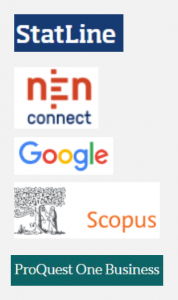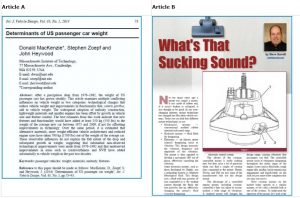2.3.1 Test your knowledge: Searching & Evaluating
Course subject(s)
2. Searching & Evaluating
Q1. Information sources
Go to the A-Z list with TU Delft Library databases and look for the following databases: NBD Online, IEEE Xplore Digital Library, TRIO, PubMed and CuminCAD.
Based on the topics of these databases, which databases can you use for information on the following research question:
“How can the automotive industry contribute to the improvement of air quality by adapting existing fuels?” (multiple answers possible)
⬜ TRID
⬜ PubMed
⬜ IEEE Xplore Digital Library
⬜ NBD Online
⬜ CuminCAD
Q2. Information sources
What document types are best suited when you are looking for an answer to the following sub-question:
How can research on fuels contribute to the improvement of air quality?
(multiple answers possible)
⬜ conference papers
⬜ patents
⬜ websites
⬜ journal articles
⬜ statistics
⬜ legislation
Q3. Information sources
Match the logos with information sources with the correct type of information:
background information
scientific information
technical information
public opinion
factual information

Q4. Searching
You are looking for articles in Google Scholar about cars but not about their design. Enter the correct operators in the search query below. Choose between the operators: OR. AND, AND NOT, NOT, –
(car ___ cars ___ vehicle*) ___ design
QS. Searching
For this question we ask you to apply a search yourself in Web of Science (Core Collection) with the table below.
Please note this exercise can only be done if you or your institution has access to www.webofscience.com.
(off-campus access for TU Delft affiliated)
Go to https://www.webofscience.com/wos and search for the entire concept “air quality”. How many results did you find?
Hint: Don’t forget to use synonyms and related terms in your query.
|
air quality |
|
air quality |
⬜ fewer than 275.000 results
⬜ between 275.000-325.000 results
⬜ between 325.000 – 375.000 results
⬜ more than 375.000 results
Q6. Searching
Let’s say you haven’t found many search results. What do you do? (tick all correct answers)
⬜ use fewer synonyms for each aspect
⬜ use more specific search terms
⬜ search in another, more suitable information source
⬜ check that you have combined the synonyms and related terms in a good way (with OR and not with AND)
⬜ apply truncation to search for more different word endings
⬜ correct any spelling or typing errors
Q7. Relevance and reliability
Which table of contents belongs to a scholarly journal? Select the correct table of content below.
Q8. Relevance and reliability
Which of these articles is a scholarly article? Select the correct article below.





